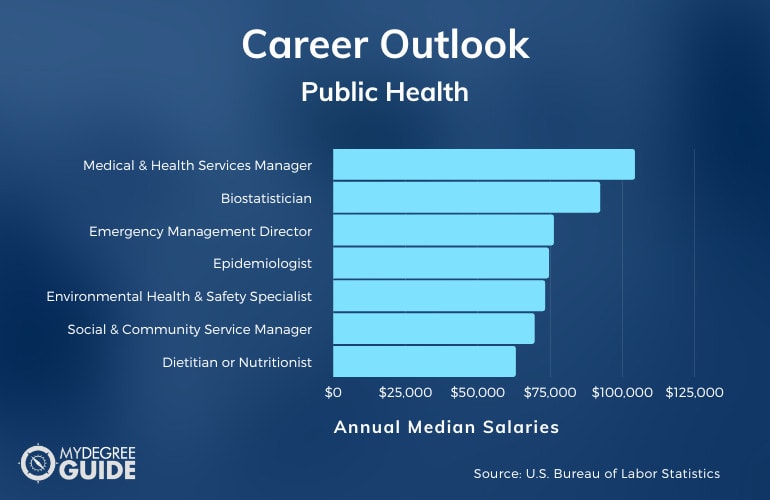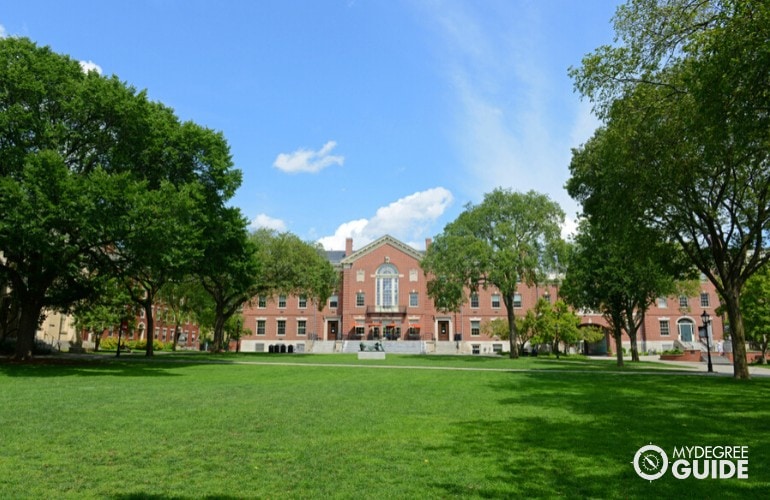Explore Online Public Health Degrees for 2024. Compare public health programs, career options, and salaries.

Earning an online public health degree can help you position yourself as a leader who promotes population health and safety. Health outcomes around the world may improve because of your work.
Editorial Listing ShortCode:
After earning an online bachelor’s degree in public health, you can also continue your studies with master’s and doctoral programs.
Universities Offering Online Bachelor’s Degree Programs in Public Health
Methodology: The following school list is in alphabetical order. To be included, a college or university must be regionally accredited and offer degree programs online or in a hybrid format.
1. American Public University
- BS in Public Health
APUS is accredited by the Higher Learning Commission.
2. Arizona State University
- Bachelor of International Public Health
Arizona State University is accredited by The Higher Learning Commission.
3. Bellevue University
- BS in Public Health
Bellevue University is accredited by the Higher Learning Commission.
4. California Baptist University
- BS in Public Health
California Baptist University is accredited by the Accrediting Commission for Senior Colleges and Universities of the Western Association of Schools and Colleges.
5. Central Washington University
- BS in Public Health – Population Health
Central Washington University is accredited by the Northwest Commission on Colleges and Universities.
6. Delaware State University
- BS in Public Health
Delaware State University is accredited by the Middle States Commission on Higher Education.
7. Excelsior College
- BS in Health Sciences – Public Health
Excelsior College is accredited by the Commission on Higher Education of the Middle States Association of Colleges and Schools.
8. Georgia State University
- BS in Public Health
Georgia State University is accredited by the Southern Association of Colleges and Schools Commission on Colleges.
9. Johnson & Wales University
- BS in Public Health
JWU is accredited by the New England Commission of Higher Education.
10. Kent State University
- BSPH in Health Promotion and Education
- BSPH in Health Services Administration
Kent State University is accredited by the Higher Learning Commission.
11. Mississippi University for Women
- BAS in Public Health Education
- BS in Public Health Education
Mississippi University for Women is accredited by the Southern Association of Colleges and Schools Commission on Colleges.
12. Monroe College
- BS in Public Health
Monroe College is accredited by the Middle States Commission on Higher Education.
13. Murray State University
- BS in Public and Community Health
Murray State University is regionally accredited by the Southern Association of Colleges and Schools Commission on Colleges.
14. National University
- BS in Public Health
National University is accredited by the Western Association of Schools and Colleges.
15. Northern Arizona University
- BS in Health Sciences – Public Health
Northern Arizona University is accredited by the Higher Learning Commission.
16. Old Dominion University
- BS in Public Health
Old Dominion University is accredited by the Southern Association of Colleges and Schools Commission on Colleges.
17. Southern New Hampshire University
- BS in Public Health
Southern New Hampshire University is accredited by the New England Commission of Higher Education.
18. University of Arizona
- BS in Public Health
The University of Arizona is accredited by the Higher Learning Commission.
19. University of Missouri
- Bachelor’s of Health Science in Public Health
The University of Missouri is accredited by the Higher Learning Commission.
20. University of North Carolina – Greensboro
- BS in Public Health Education
The University of North Carolina at Greensboro is accredited by the Southern Association of Colleges and Schools Commission on Colleges.
21. University of South Florida
- BSAS in Public Health
USF is accredited by the Southern Association of Colleges and Schools’ Commission on Colleges.
22. University of Southern Indiana
- BS in Health Services – Public Health
The University of Southern Indiana is accredited by the Higher Learning Commission.
23. University of the Cumberlands
- BS in Public Health
The University of the Cumberlands is accredited by the Southern Association of Colleges and Schools Commission on Colleges.
24. University of West Florida
- BS in Health Sciences – Public Health
The University of West Florida is accredited by the Southern Association of Colleges and Schools Commission on Colleges.
25. Walden University
- BS in Public Health
Walden is accredited by The Higher Learning Commission.
Online Public Health Degrees
Select the program that most interests you to jump to that section of the guide:
Public health is a popular field of study, so a number of colleges offer related degrees.
Public Health

An online degree in public health can help you engage in work that improves health and safety for people in your community or around the world.
Many public health workers are educators. If you enjoy teaching things to others, that might be a good job for you. You might be employed by a community organization to teach nutrition classes, run vaccination campaigns or design informative flyers.
Leadership skills are useful for administrative roles. You might direct program staff or oversee healthcare clinics. These jobs often involve budgeting and grant-writing responsibilities.
Editorial Listing ShortCode:
You may have your sights set on a public health career because you believe that quality healthcare should be accessible to all people. In that case, you might want to work in the public policy arena to influence future laws.
Being a community health worker is a related job. You might be responsible for enrolling people in public health programs or connecting them to social services in their communities. This type of job might be available in a public health department, a community clinic or a hospital.
Research is an important part of the public health field. As a scientist, you might study disease patterns, analyze health data or research the effectiveness of health campaigns. Epidemiologists and biostatisticians fall into this job category, and environmental health experts often conduct studies as well.
Community Health Education

Helping others improve their health often begins with education. Health educators spend their careers teaching people more about their safety and wellbeing. Your work may address nutrition, disease prevention, maternal health or disaster response.
In a community health education concentration, you’ll likely take courses on population health and the American healthcare delivery system. Other classes may teach you to assess community needs so you can build educational programs in response.
You may also learn to advocate for health-related policies, oversee public health initiatives, and secure grants and other funding.
Editorial Listing ShortCode:
After earning this degree, you may get a job as a health educator. This job is often found in government agencies, such as public health departments. Hospitals, religious groups and community organizations also hire health educators.
You may choose to become credentialed as a Certified Health Education Specialist (CHES) or a Master Certified Health Education Specialist (MCHES).
Healthcare Administration

Health administrators oversee the people and departments that make healthcare organizations work. If you want to be a leader in public health organizations, this degree concentration can help equip you with the skills you’ll need.
You likely learn how to empower team members to improve community health through programs, research, education and public policies.
Like most public health students, you may take courses on healthcare delivery systems, epidemiology, biostatistics, health law and behavioral science. In addition, you may have classes on leadership and learn managerial skills, such as budgeting, human resources and quality management.
Editorial Listing ShortCode:
You may also study marketing, communications and community assessment.
You might apply this degree as a leader in a community health organization, such as a nonprofit clinic or a county health department. Organizations like schools and corporations may rely on your expertise to coordinate their health and wellness initiatives. Your job title might be community health manager or health promotion director.
Public Health Curriculum & Courses

When studying for a public health online degree, you should take many courses on health-related topics, such as epidemiology, healthcare delivery and health equity. You may also need to learn about behavioral science, organizational leadership and program management. Some common courses taken for this degree include:
- Behavioral Science Theories: Understanding how people make decisions and what motivates them to change can help you provide meaningful health education that shifts actions and attitudes.
- Community Assessment: This course can help you learn to conduct evaluations to identify community health needs and plan beneficial programs.
- Epidemiology: An introductory course on epidemiology can help you learn about statistical analysis in public health and explore disease patterns.
- Global Health: Studying the health of populations around the world can help you learn more about healthcare equity, cultural contexts and health policies.
- Health and Environment: This class covers how surroundings, including work environments and food and water supplies, affect health and safety.
- Health Education and Promotion: This class can help you learn more about designing educational initiatives to help people make healthy choices.
- Healthcare Delivery: This course is an introduction to the American healthcare system, the organizations that are involved and the payers that cover the bills.
- Introduction to Public Health: Early in your program, you’ll probably take a foundational class that covers the history of public health as well as modern issues in community health.
- Law and Ethics in Healthcare: Operating in a legal and ethical manner is important for anyone working in healthcare settings, so this class addresses local and national laws and may include case studies.
- Research in Health Science: This class can help you learn how to interpret others’ research studies and conduct your own experiments and statistical analyses.
Your curriculum may include a capstone course to help prepare you to enter the public health workforce. There may be a practicum or internship component.
Public Health Careers & Salaries

According to the U.S. Bureau of Labor Statistics, the median annual salary for community health workers and health educators is $48,140. This job category is expected to grow at a 13% rate through the next ten years.
Some careers in the public health field include:
| Careers | Annual Median Salary |
| Medical and Health Services Manager | $104,280 |
| Biostatistician | $92,270 |
| Emergency Management Director | $76,250 |
| Epidemiologist | $74,560 |
| Environmental Health and Safety Specialist | $73,230 |
| Social and Community Service Manager | $69,600 |
| Dietitian or Nutritionist | $63,090 |
| Health Education Specialist | $56,500 |
| Occupational Health and Safety Technician | $53,340 |
| Community Health Worker | $42,000 |
An online bachelor’s degree in public health can help you secure entry-level jobs in this field. Going back to school for a public health master’s degree or doctorate may help you move into managerial roles or coordinate scientific research. Higher paychecks may accompany positions of greater responsibility.
Choosing an Online Public Health Degree

Public health is a popular field of study, so many schools offer related degree programs. You’ll need to narrow down the selection to one that will do a great job of meeting your needs.
First of all, you may be looking for a school that is reputable. The best way to determine that is based on accreditation status. Regionally accredited schools have demonstrated their commitment to quality academics throughout all of their departments.
In the public health field, you may also want to consider whether a program has received accreditation from the Council on Education for Public Health (CEPH). This independent organization reviews public health schools and programs to evaluate their adherence to industry standards.
Next, you may want to consider what class format is best for you. While many schools use traditional on-campus classes, others offer an online degree in public health. Some students enjoy face-to-face interaction and accountability, but you may appreciate online classes for their flexibility.
Sometimes, an online degree can be earned more quickly than an on-campus one. Online programs may use accelerated calendars, grant credit for previous work experience or allow you to move at your own pace.
Despite the quick speed, you’ll cover similar material and complete similar assignments, so you can count on getting a thorough education.
After deciding to earn a public health degree online, look into the class format of various colleges. Some schools have you log in for live lectures at specific times, and others give you around-the-clock access to the material. While that’s a more flexible approach, you may prefer the accountability of a set schedule.
Other factors that may help you pick a school include:
- Cost
- Course list
- Graduation rate
- Specialization options
To learn more about a school’s strengths, ask the admissions department for more information.
Admissions Requirements

What does it take to get into an online public health program? The answer depends on the school where you’re applying, but most colleges do have some common application requirements.
In addition to an application form and a fee, you may need to submit:
- Essay: A personal statement showcases your strengths, your ideas and your areas of interest.
- References: Professional colleagues and academic mentors can share insights on why you’d be a good candidate for a college’s public health program.
- Test scores: You may need to turn in ACT or SAT scores for a bachelor’s degree program or GRE scores for graduate studies, but waivers are sometimes available.
- Transcripts: These documents are records of your high school classes and any college courses that you’ve completed.
Be sure to read application directions thoroughly and turn all materials in on time. Promptness and attention to detail may increase your chances of being admitted.
Accreditation

Regional accreditation is a sign that a college knows what it’s doing. To receive this distinction, schools must demonstrate that they offer strong academic programs, support their students well and operate in an efficient, ethical manner.
Enrolling at a regionally accredited school means that you can trust the quality of your education. Employers are more likely to look upon your degree favorably. You’ll probably be able to transfer your credits elsewhere or use your degree to fulfill prerequisites for graduate programs.
The Northwest Commission on Colleges and Universities (NWCCU) is one example of a regional accreditor. Visit the Council for Higher Education Accreditation (CHEA) website to view the full list of approved regional accreditors.
When enrolling in a public health program, you may also want to look for accreditation from the Council on Education for Public Health (CEPH). This organization evaluates whether a school’s curriculum adequately prepares students for public health jobs.
Financial Aid

Assembling a financial aid package can help you afford to enroll in college. Accredited online public health programs are eligible for government aid just like on-campus ones are.
Most federal financial aid comes in the form of grants and loans. Grants are free gifts that you don’t have to pay back. Those typically go to students with the greatest financial need.
With loans, you’re just borrowing the money until you finish school. After graduation, you’ll have to start paying it back with interest. The interest rate on government loans is usually fairly low compared to private loans.
To learn about your eligibility for federal assistance, submit the Free Application for Federal Student Aid (FAFSA). Your FAFSA results may also qualify you to receive grants or loans from your state.
Scholarships are another important type of college assistance. Unlike government aid, scholarships are usually given based on merit rather than financial need. Even still, some scholarship funds are specifically designated for underprivileged students.
You may win one or more scholarships based on:
- Academic achievements
- Civic club or religious group membership
- Community involvement
- Family background
- Leadership skills
Start looking for scholarships early, and be sure to submit all application materials on time. As part of the process, you may need to send in essays or participate in interviews.
Apply to many different scholarship programs. Although you may not receive a full ride, even small scholarships can add up.
Scholarships

Some scholarship programs focus on rewarding students who plan to major in public health. Industry organizations often sponsor these scholarships to encourage strong students to enter this important field. Some programs offer hands-on learning opportunities in addition to tuition funding.
- Association of Food and Drug Officials Scholarships: AFDO awards the Betsy B. Woodward Scholarship, the Denise C. Rooney Scholarship and the George M. Burditt Scholarship to college juniors who plan to work in food, drug or product safety.
- Health Occupations Students of America Scholarship: If you are a high school member of HOSA, you can apply for this scholarship, which is offered to students interested in a variety of health-related disciplines, including public health.
- National Institutes of Health Undergraduate Scholarship Program: Disadvantaged students who win a renewable scholarship from NIH will receive tuition assistance, paid summer training opportunities and paid post-graduation employment.
- Vivian Drenckhahn Student Scholarship: If you belong to the Society for Public Health Education, you may be eligible to win one of three annual scholarships for undergraduate or graduate students in a health education program.
For scholarship programs like these, you may need to demonstrate to the selection committee how you will use your education to make a positive difference in community and global health. Writing a clear, compelling essay may help prove your point.
Being articulate in an interview can help as well, so be sure to think through your answers ahead of time.
What Can I Do With a Bachelors in Public Health?

With an online bachelor’s degree in public health, you may become a health educator or a community health worker. These jobs are often found with government agencies. You could also help hospitals perform community outreach or work in a corporation to support employees’ health and safety on the job and at home.
Emergency management is another job that may be open to you with a bachelor’s degree. Municipal governments often hire for this position.
What Is a Degree in Public Health Good For?
Studying public health can help you obtain essential skills that are needed for contributing to worldwide health and wellness. Public health professionals focus on improving health outcomes for entire communities or populations.
A public health degree can help you become a researcher, a health educator or an emergency management director. You might run public relations for a healthcare group, influence public policy or study environmental hazards. Your work might focus on a particular area, such as nutrition or vaccinations.
Is Public Health a Science Degree?

At the undergraduate level, a public health degree is usually offered as a Bachelor of Science in Public Health. That makes sense, considering that you’ll probably study biostatistics, epidemiology, behavioral science and environmental health.
At the master’s level, you could pursue one of the traditional or online Master of Public Health (MPH) programs or Master of Science in Public Health (MSPH) programs. Typically, an MPH equips students for in-the-field professional practice, and the research-heavy MSPH prepares students for careers in academia. In addition, there are one year MPH programs for those who want to finish quickly.
What Is CEPH Accreditation?
The Council on Education for Public Health (CEPH) is an accrediting association that analyzes colleges’ public health offerings. CEPH-accredited schools meet accepted standards for public health education and should do a good job of getting you ready for the workforce.
Accredited programs have a reputation for quality, and you can often transfer your credits from one CEPH-approved school to another. CEPH grants programmatic accreditation at both standalone programs and schools of public health.
Are There Any Affordable Online Public Health Degrees?

Yes, you should be able to find a college program that fits your budget! Many online public health degrees cost between $300 and $600 per credit hour. You’ll probably need around 120 credits to graduate.
Scholarships and government financial aid can help you afford the cost of tuition. You may also save money by enrolling at a public university in your home state or attending a school that offers in-state tuition to all students.
What Is the Average Bachelor Degree in Public Health Salary?
Your salary will depend greatly on what job you take. For example, environmental health and safety specialists usually make more than community health workers. Jobs with higher pay may require you to gain experience or go back to school for a master’s degree.
According to the Bureau of Labor Statistics, the average salary of people with a Bachelor of Science in Public Health ranges from $42,000 to as high as $104,000 each year, depending on the job taken and experience, among other factors.
What Are the Best Public Health Degree Jobs?

The best public health career for you will depend on your interests. If you like teaching others, then you might want to work in the growing field of public health education. If research and statistical modeling appeal to you, then you might prefer a career in epidemiology.
Some of the highest-paying jobs in public health involve leadership and management responsibilities. Safety manager and health services manager are two examples of jobs that may pay well.
How Much Money Can I Make with a Public Health Degree?
The salary that you’ll earn with a bachelor’s degree in public health will depend on the type of job that you have. According to National Association of Colleges and Employers, the starting salary for those with a bachelor’s degree in public health averages at $44,894 per year. Working as a community health worker pays on average around $42,000 (Bureau of Labor Statistics), but you might earn six figures as a medical services manager.
To increase your salary potential, think about adding certifications to your resume or going back to school to earn a Master of Public Health. Professional experience may lead to raises as well.
Are there Requirements for an Online Public Health Degree Program?

You may need to have a few college classes under your belt before you can be admitted to a public health program. Science classes like biology and chemistry are common prerequisites, and you may need to achieve a minimum grade.
If you’ll be earning practicum hours in a community health setting, the school may require some safety measures. You may need to complete a background check, become certified in CPR or provide proof of immunization.
What Types of Public Health Degrees can I Get Online?
You can earn a bachelor’s, master’s or doctorate in public health online. Many are CEPH-accredited.
A bachelor’s degree in this field is usually a Bachelor of Science in Public Health. Some schools offer concentration options in allied health, health education, environmental health or global health.
Concentrations are more common at the master’s level, though. In a graduate program, you might focus your studies on epidemiology, biostatistics or health administration.
What can I Expect to Learn While Getting an Online Public Health Degree?

In a public health program, you’ll likely study healthcare delivery, human behavior, statistics, and health law and learn about ways to communicate with others, analyze community problems and coordinate programs.
Because you may head up a health organization someday, you’ll probably also study management skills. These may include budgeting, grant-writing and organizational leadership.
You may also need to study cross-cultural relationships. Diversity training is especially important if you plan to work in an overseas setting.
Getting Your Public Health Degree Online

Public health is a rewarding field for many. Your efforts may transform community behaviors, connect clients to supportive resources and make workplaces safer for all employees. The work you do may also improve health equity, uncover patterns of disease or lower child mortality rates.
If these career possibilities appeal to you, then it’s time to apply to a public health online degree program. Your studies can help equip you with essential skills for the modern public health workforce. Classes at the best online schools can help prepare to make a long-lasting difference in the health and safety of communities around the world.
